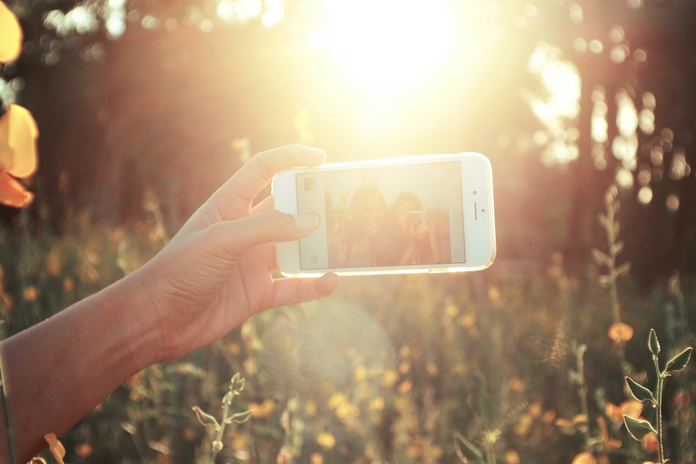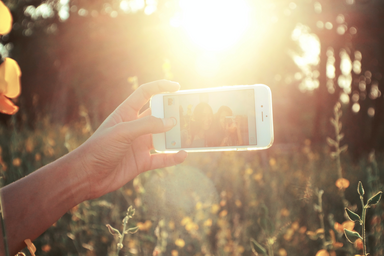Imagine: You haven’t seen your best friend for six months. She has been studying abroad and she has finally come home. This is the reunion that you have both been waiting for from the start. You are walking up to her door, but before you ring her doorbell, you reach into your purse to grab your phone. You swipe, enter your pass code, and simultaneously press a little yellow icon with silhouette of a ghost while using the other hand to ring her doorbell. You hold down on the circle on your screen when you hear the doorknob turn. From behind the door appears your best friend, mirroring you, with a phone held up in front of her face as well. Both of you scream as you record your reunion for all of your followers to see.
If this hasn’t been you in the past, then you have at least seen this scene play out on someone’s Snapchat story. This singular occurrence in my life was the turning point for me. This was the moment I began to think that perhaps we are a little consumed with social media. Further, perhaps we are only consumed with what people think we are doing, not what we are actually doing.
For months, I thought back to this event. The fact that the first time I had seen my friend in half of year, I wasn’t staring into her eyes, or even at her person; I was staring into a screened image of her in front of me, and she was doing the same. Our moment of reuniting was no longer an intimate one, because both of us had prioritized making sure that other people were seeing that we were seeing each other, before we could even do so ourselves. Sure, this is an extremely analytical description of a single moment, but perhaps our obsession with capturing moments is taking us away from living in them.
I have been a member of Snapchat since my junior year of high school, approximately six years. I even remember the first day that I downloaded it; everyone in my drama class sat in a circle sending the ugliest selfies we could manage to each other. Over the years, Snapchat has evolved. They have introduced new features, such as filters, stickers, and faces. But the one feature that has been the most influential are “stories.” Snapchat stories, essentially, are personalized icons connected to your account where you can post a picture or video for 24 hours for all of your followers to see. It tells everyone at once what you are doing in your life and relieves the notion of having to send an individual picture to everyone you know.
We all became obsessed with Snapchat stories. Everywhere I went, I would make sure to story it. You would start to hear phrases such as “Wait do that again, I need to story it” or “Before we leave I need to get this for my story” or “Do something cute so I can put it on my story.” Cheeky sayings arose based off of this compulsive need to post, such as “If you don’t put it on your Snapchat story, did it even happen?”
I was in the middle of this world. I was consumed with the idea that my life needed to be fun and exciting through this medium. I felt on some level that people would judge me if it wasn’t at a certain standard.
And the truth is that we do inherently judge people based off of these stories. We have all had the thought of “They did that just so that they could post it on their story for people to see.” I found that I was becoming judgmental in a silent and internal way, but judgmental nonetheless.
I knew that it had all become too much for me when I was hanging out with a group of friends and went on my phone to check Snapchat. I saw another group of my friends at a bar hanging out together and I felt like crying because they were having fun without me somewhere else. Even though I was with another group of people who loved and cared about me, I couldn’t help but feeling like I needed to be in two places at once. I decided at that moment that this artificial reality was no longer worth the FOMO (Fear Of Missing Out).
I deleted my Snapchat application on February 1st, 2017. I never realized how much a tiny, little application had such a hold on my life and my happiness. Since deleting it, the feeling of FOMO has subsided. The judgment and jealously of watching the highlights of peoples life’s has gone away because that’s all it really is: a reel of highlights. I don’t waste as much time on my phone, and when someone asks if I saw something on their story and I respond “no”, they verbally tell me instead, and I get the interesting long story, rather than the ten-second clip of the moment.
I am not writing off Snapchat as an evil app. A lot of people still get happiness out of the features that it offers, but if it brings you more despair than happiness, while it was not easy to know that the absence of this app would keep me a little out of the loop and that I was perhaps missing out on stuff, it was worth it. My happiness and my mood have improved significantly.
I think that we are conditioned nowadays to feel left out if we are not involved in social media. After this change, I view it as more of a cage that we are free to step out of any time, but we continue to sit in it because it is comfortable, without realizing the freedom outside. Challenge yourself to get rid of some form of the artificial reality on your phone. Don’t banish all social platforms, I still have Instagram and Facebook, but the effects of detoxing just one app might surprise you.


